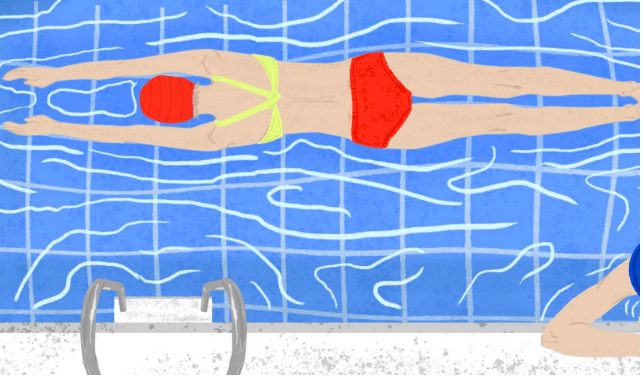First published on VICE Weekends, January 2017
f you take the coastal path south from Coogee Bay, past the bobbing surfers and beachside revellers, you’ll reach a sign that reads “Ladies and Children Only” and another that tells you, “Entry 20 Cents.” Throw your change in the plastic bucket, follow the cream-coloured staircase and you’re at McIver’s Baths. The dappled-green ocean pool, tucked under the curve of a sandstone cliff with views to Wedding Cake Island, is the last women’s only-baths in Australia. Here, Sydney women have jumped off rocks, swum laps in the sun or gazed out at the Pacific since before 1876. Or, if you believe the legend that this site once served as a swimming spot for Indigenous women—then the date stretches back well before that.
“There’s a 20 cent charge, there’s always ladies sitting on patio chairs taking the donations and you go into the changing rooms, an old wooden building that isn’t anything special, except for you can just hang out there and look at this amazing view,” laughs D’Arcy Barron, a regular patron of McIver’s over the years. “People use the word sacred space too easily, but to have a space where women can just be, in whatever state of dress or undress they want is so freeing. You can wear your togs, not wear your togs. It doesn’t matter what shape you’re in. It’s great.”
Carol Carter, the president of the Randwick and Coogee Amateur Ladies Swimming Club, operators of the baths since 1922, the year the lease was transferred from founders Rose and Robert McIver, has been swimming at the pool for 30 years. She says the significance of the baths over the last century is compounded by the fact that female swimmers were once considered unladylike.
“Social historians have suggested that until the middle of the 20th century, women playing sports such as horse riding and croquet were tolerated and tennis was accepted because it could be seen as a ritualised form of courting, but swimming was not only segregated by sex but positively discouraged,” Carter says. “My daughter learned to swim at the baths, instructed by volunteers and when I was in a position to, I took over the learn to swim programme and helped run the swim club, which was held at the baths on Saturday mornings. This involvement has been a huge influence on my life.”
For Barron, too, the Baths have been a rite of passage. “I’m actually afraid of the ocean and it’s given me a safe way of experiencing it. The first time I visited McIver’s with a friend, I hadn’t been in the sea in about ten years. It just woke my spirit. Each time I go there, I reconnect with elemental things. But it’s also very warm and embracing,” she says.
When I visit, it’s a cloudy December morning and the tide’s turned the Baths into a whirlpool, swirling with white foam. Women of all ages and backgrounds drift on their backs, read alone on the grassy outcrops and chat on the rocks, as crabs skitter past. I take the stairs and wade in, unprepared for the icy water and thick moss. “It’s freezing cold, but refreshing!” a swimmer warns.
According to Carter, McIver’s latest incarnation is down to the pool’s popularity with a new demographic, including pregnant women, nuns and Muslim women who prefer to swim in gender-segregated areas. But, as relevant as it continues to be, it’s not immune to threat. In 1995, Coogee resident Leon Wolk, angry at the presence of a women’s-only swimming space, took a complaint to the Anti-Discrimination Board. Although McIver’s was granted an exemption from the Anti-Discrimination act, this expires in 2020. The other challenges are more complicated.
“The Baths are managed by volunteers and it’s difficult to have sufficient volunteers to cover the duties as required. Women new to the pool aren’t aware that it’s volunteer-run and can take it for granted—and social media means that more and more people come to ‘have a look’,” she says. “Most of the long-term users don’t want change and they enjoy the quiet moments at the baths where women respect each other’s privacy. That’s why we’ve kept the entry fee the same for many years.”
Therese Spruhan, another McIver’s regular, believes that the pool will prevail because it’s such a special place. “My favourite swim was a couple of years ago when I introduced a friend to the pool,” she says. “It was late in the day, the sun had gone behind a cloud and it started to rain. The pink hydrangeas above the pool were in flower and when we pushed off into the water we both felt instant relief. And older regular said to me that the pool holds the spirits of all the women who have swum there over the years. I thought that was the perfect description.”
